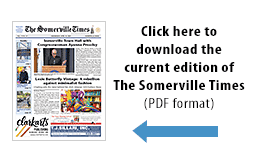 By Joseph A. Curtatone
By Joseph A. Curtatone
(The opinions and views expressed in the commentaries of The Somerville News belong solely to the authors of those commentaries and do not reflect the views or opinions of The Somerville News, its staff or publishers.)
It may not sound as exciting as a summer blockbuster, but the zoning reform bill on Beacon Hill offers so many potential benefits for Somerville that I encourage you to settle in for some brief summer reading about it.
Somerville has a goal of creating 6,000 new housing units by the year 2030, including 1,200 permanently affordable units, keeping up with the growing demand to live in our community and allowing residents to remain in their homes in an evolving city. At the same time, the city has a goal of creating 125 new acres of publicly accessible open space in the next 13 years. Both goals are in response to the two most frequent demands from our residents.
What stands in our way is an outdated state zoning code that ultimately ends up favoring single-family subdivisions instead of smart, transit-oriented developments, the latter of which are the very kind of projects the community has told us it wants to see in our densely populated city, especially with the Green Line Extension on its way.
Massachusetts’ 70s-era zoning creates a byzantine set of complex permitting requirements that can drown badly needed smart transit-oriented developments, and thoughtful planning risks withering in Land Court. Meanwhile, while Somerville already faces challenges in creating open space, 22-acres a day of open space in Massachusetts is turned into low-density residential sprawl.
That is why I support the zoning reform bill on Beacon Hill, which would align the state’s laws with Somerville’s values as well as best practices now universally accepted by planners.
Sponsored by Rep. Stephen Kulik and Sen. Daniel Wolf, the bill would streamline the permitting process by allowing developers of major projects – larger than 25,000 square feet or 25 units – to submit a common application to the city or town where the project is located. That application would go to all permit-granting boards, which would come together for a joint hearing at the beginning of a project review, ensuring that everyone receives the same information, including members of the public who want to weigh in. In the case of disagreements, neutral facilitators could be used at the local level to settle disputes over proposed developments, taking them out of the time-consuming courts.
Somerville and other cities and towns could choose to adopt zoning changes, such as designating “dense-growth zones” – perfect for Somerville and, in particular, land around the coming Green Line Extension stations – that would make the city eligible for state planning money and potentially unlock millions of dollars for sewer and water infrastructure aid. Also, adopting dense-growth zones would give the city the ability to assess impact fees on projects for necessities such as schools and libraries that could face increased demand as more families move to Somerville.
More and more families are choosing Somerville, and we want them to come here and our current families to stay. These zoning reforms would help us create the moderate and affordable housing stock that families need while ameliorating any concerns about additional burdens on our schools, public services and infrastructure.
Meanwhile, the bill also establishes what we already know and embrace in Somerville: that public health is a purpose of master planning. The state would provide additional incentives for creating walkable, healthy neighborhoods. We are well ahead of the curve in Somerville with regard to creating walkable, healthy neighborhoods, but getting the state to specifically delineate that goal within the zoning code would make it even easier to achieve our vision for the city.
Somerville has already taken steps to achieve the goals that the zoning reform bill strives for. We have our inclusionary zoning ordinance that requires any new development with eight or more housing units to reserve 12.5 percent of its units for permanently affordable housing, and we are considering increasing that to 15 percent based on our housing needs assessment. We have our linkage fee, which requires developers of large-scale commercial projects to pay into the Somerville Affordable Housing Trust to continue creating affordable homes, and we are considering increasing that fee.
Households earning the state median income currently spend half of their income on housing and transportation costs. Meanwhile, Massachusetts is on pace to build fewer than half the homes needed annually in the Boston metro area to meet housing demand. Changes to state zoning law will help Somerville and surrounding towns better meet housing needs while developing into healthier, walkable, affordable communities. If that sounds familiar it’s because adoption of the state zoning reform bill would signal that Massachusetts is now embracing the fundamental values that Somerville has already set forth in our 20-year SomerVision plan, in our policies and our advocacy. This is an important statewide change, one that would grant Somerville the ability to attract and retain the city’s best asset: its people.















Reader Comments